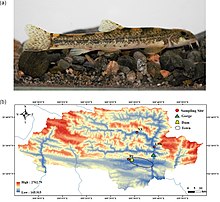Triplophysa bleekeri is a species of stone loach in the genus Triplophysa. It is endemic to China. It grows to 8.2 cm (3.2 in) TL.[1] Having a wide distribution across the Qinghai-Tibet Plateau, it lives in fast-flowing rivers from 200 to 3,000m in altitude.[2] Being an unusual species inhabiting high-altitude regions, it is an excellent model to investigate the genetic mechanisms of adaptation to the local environment. With this in mind a chromosomal-scale genome assembly was sequenced and assembled with a genome size of ~628 Mb. This data finding that the Triplophysa genus likely diverged when the Qinghai-Tibet Plateau elevated by >4,000 m roughly 40 million years ago.[3]
| Triplophysa bleekeri | |
|---|---|
| Scientific classification | |
| Domain: | Eukaryota |
| Kingdom: | Animalia |
| Phylum: | Chordata |
| Class: | Actinopterygii |
| Order: | Cypriniformes |
| Family: | Nemacheilidae |
| Genus: | Triplophysa |
| Species: | T. bleekeri
|
| Binomial name | |
| Triplophysa bleekeri (Sauvage & Dabry de Thiersant, 1874)
| |

Etymology
editAlthough the fish's patronym is not identified but it is clearly in honor of Pieter Bleeker (1819-1878), a Dutch medical doctor and ichthyologist.[4]
References
edit- ^ Froese, Rainer; Pauly, Daniel (eds.). "Triplophysa bleekeri". FishBase. November 2014 version.
- ^ Wang, ZJ (2013). "The reproductive traits of Triplophysa bleekeri in the Daning River". Freshwater Fisheries. 43 (5): 8–12.
- ^ Yuan, Dengyue; Chen, Xuehui; Gu, Haoran; Zou, Ming; Zou, Yu; Fang, Jian; Tao, Wenjing; Dai, Xiangyan; Xiao, Shijun; Wang, Zhijian (2020-11-10). "Chromosomal genome of Triplophysa bleekeri provides insights into its evolution and environmental adaptation". GigaScience. 9 (11). doi:10.1093/gigascience/giaa132. PMC 7684707. PMID 33231676.
- ^ Christopher Scharpf & Kenneth J. Lazara (22 September 2018). "Order CYPRINIFORMES: Family NEMACHEILIDAE (r-y)". The ETYFish Project Fish Name Etymology Database. Christopher Scharpf and Kenneth J. Lazara. Retrieved 14 April 2022.